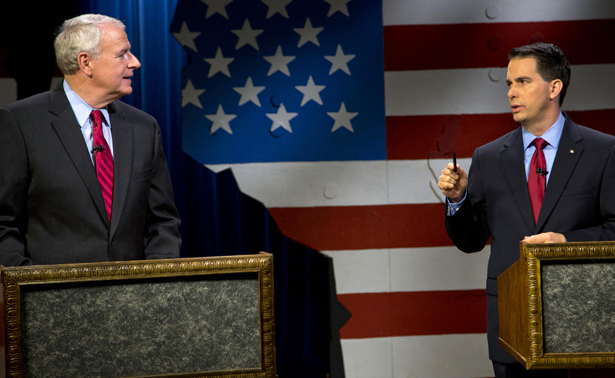 Republican Wisconsin Governor Scott Walker, who is facing a recall election, and Democratic challenger and Milwaukee Mayor Tom Barrett (left) talk before the start of the debate in Milwaukee, Wisconsin, May 25, 2012. REUTERS/Darren Hauck
Republican Wisconsin Governor Scott Walker, who is facing a recall election, and Democratic challenger and Milwaukee Mayor Tom Barrett (left) talk before the start of the debate in Milwaukee, Wisconsin, May 25, 2012. REUTERS/Darren Hauck
Last Friday night’s Wisconsin recall election debate began a series of bizarre exchanges between Republican Governor Scott Walker and his Democratic challenger, Milwaukee Mayor Tom Barrett, over Walker’s attitudes regarding direct democracy.
During this campaign, Walker and his supporters have been harshly critical of those who have sought to recall and remove the governor and his political allies. Though the Wisconsin Constitution is absolutely clear that the reasons for recall elections are to be defined by those who seek them—as opposed to the politicians who would like to restrict the scheduling of accountability votes—the Walker camp has claimed that the recall is an expensive and unnecessary political gambit.
Barrett challenged this spin with a suggestion that Walker is a recall hypocrite.
Referring to Walker during the debate, Barrett said: “He has signed recall petitions, it’s my understanding, against Senator Feingold, against Senator Kohl, not for criminal misbehavior, but because he disagreed with political decisions that were made.”
Walker did not respond immediately. But the next day the governor said, “I have no memory” of signing on for the recall of the Democratic senators when they were targeted in 1997 by anti-abortion groups.
Since organizers of the Feingold-Kohl recall effort say they’re unaware of whether Walker signed, and since the old petitions have been destroyed, this particular debate may remain unresolved.
But there is no question that Scott Walker has spoken enthusiastically about the use of the recall power. Indeed, he attained his previous position as Milwaukee County executive in large part because of a recall initiative. And that initiative clearly delighted him.
Back when he was a state legislator, Walker was an enthusiastic proponent of recall elections—especially in Milwaukee County.
Walker got even more enthusiastic about recalls in 2002, when he became the favored candidate of the group seeking to remove Milwaukee County Executive Tom Ament. After Ament resigned, Walker was elected to replace him.
When he ran for governor in 2010, Walker talked up the 2002 recall drive as an exercise in democracy.
Speaking of the Milwaukee County fight, Walker said: “You know the folks that were angry about this started a recall and they were told they needed to collect 73,000 signatures in sixty days. Well, not hundreds, not thousands, but tens of thousands of ordinary people did an extraordinary thing. They stood up and took their government back. In less than thirty days they collected more than 150,000 signatures. It was at that moment I realized the real emotion on display in my county wasn’t just about anger. You see, if it had been about anger, it would have been about people checking out and moving out or giving up. But instead what happened was really amazing. You saw people standing up shoulder to shoulder, neighbor to neighbor and saying ‘we want our government back’ And in doing so the real emotion on display was about hope.”
Well, not hundreds, not thousands, but tens of thousands of ordinary people did an extraordinary thing last winter. They have gathered more than 900,000 signatures seeking the recall of Scott Walker, more than 800,000 seeking the recall of Lieutenant Governor Rebecca Kleefisch and close to 100,000 more to recall four Republican state senators. Wisconsinites are again standing up, shoulder to shoulder, neighbor to neighbor, and they are saying “we want our government back.”
And, as the United Wisconsin activists who organized and advanced the recall drive will tell you, the real emotion on display across Wisconsin as the recall petitions were gathered last year, and as the recall fight has played out this year, has been about hope for Wisconsin’s future.


